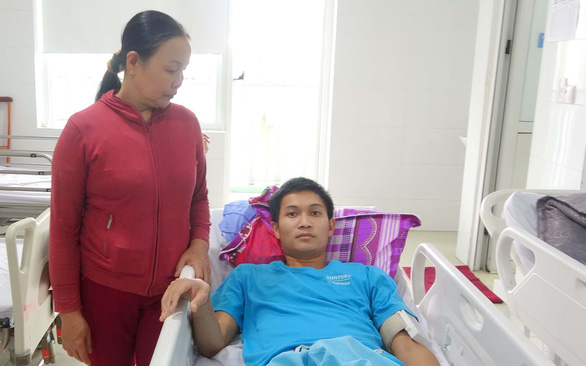A hospital in Da Nang has been successful in inducing ‘hibernation’ in a patient to prevent brain damage, creating a window for his body to recover from a circulatory arrest.
Doctors at Da Nang Hospital in the namesake central city recently performed the ‘human hibernation’ procedure on Le Phuoc Khanh, 30, a patient from the central province of Quang Nam.
Khanh became one of the rare documented cases of such method being used in Vietnam.
The 30-year-old man was playing a football game when he suddenly suffered a cardiac arrest, resulting in a coma on December 11.
Upon his hospitalization at Da Nang Hospital, Khanh was diagnosed with the Brugada syndrome, a genetic disorder in which the electrical activity within the heart is abnormal.
It increases the risk of abnormal heart rhythms and sudden cardiac death, and those affected are prone to episodes of passing out, according to the European Journal of Internal Medicine.
Although doctors treated Khanh with sedatives and put him on ventilator, he did not regain consciousness due to brain damage as a result of a circulatory arrest.
Facing the emergency, the board of directors at Da Nang Hospital decided to treat Khanh by deliberately reducing his core body temperature to 33 degrees Celsius for 24 hours, before gradually warming him up again.
The procedure is known as therapeutic hypothermia, or targeted temperature management. It works by preventing further brain damage, giving the patient’s body a window to recover.
According to doctor Vo Duy Trinh – head of Department of Intensive Care and Anti-Poison at Da Nang Hospital, hypothermia counteracts many of the destructive mechanisms of cardiac arrest.
Hypothermia can help improve health outcomes during recovery after a period of interrupted blood flow to the brain.
“During hypothermia, the brain needs less oxygen, tissues need less energy, and less calcium enters cells, so the degree of cell damage due to lack of blood flow is reduced,” doctor Trinh explained.
After the special treatment, Khanh could open his eyes and was able to blink and move his body.
The patient is now fully awake, can communicate and eat well, and sustain no permanent neurological damage.
According to doctor Nguyen Tan Hung from the Department of Intensive Care and Anti-Poison at Da Nang Hospital, Khanh was lucky to have completely recovered from such an out-of-hospital circulatory arrest.
“Thanks to the timely application of hypothermia during the ‘golden’ period, patients who suffer a circulatory arrest have a greater chance of staying alive and regaining consciousness and movement afterwards, with the case of Khanh being a typical example,” doctor Hung said.
Like us on Facebook or follow us on Twitter to get the latest news about Vietnam!




















































